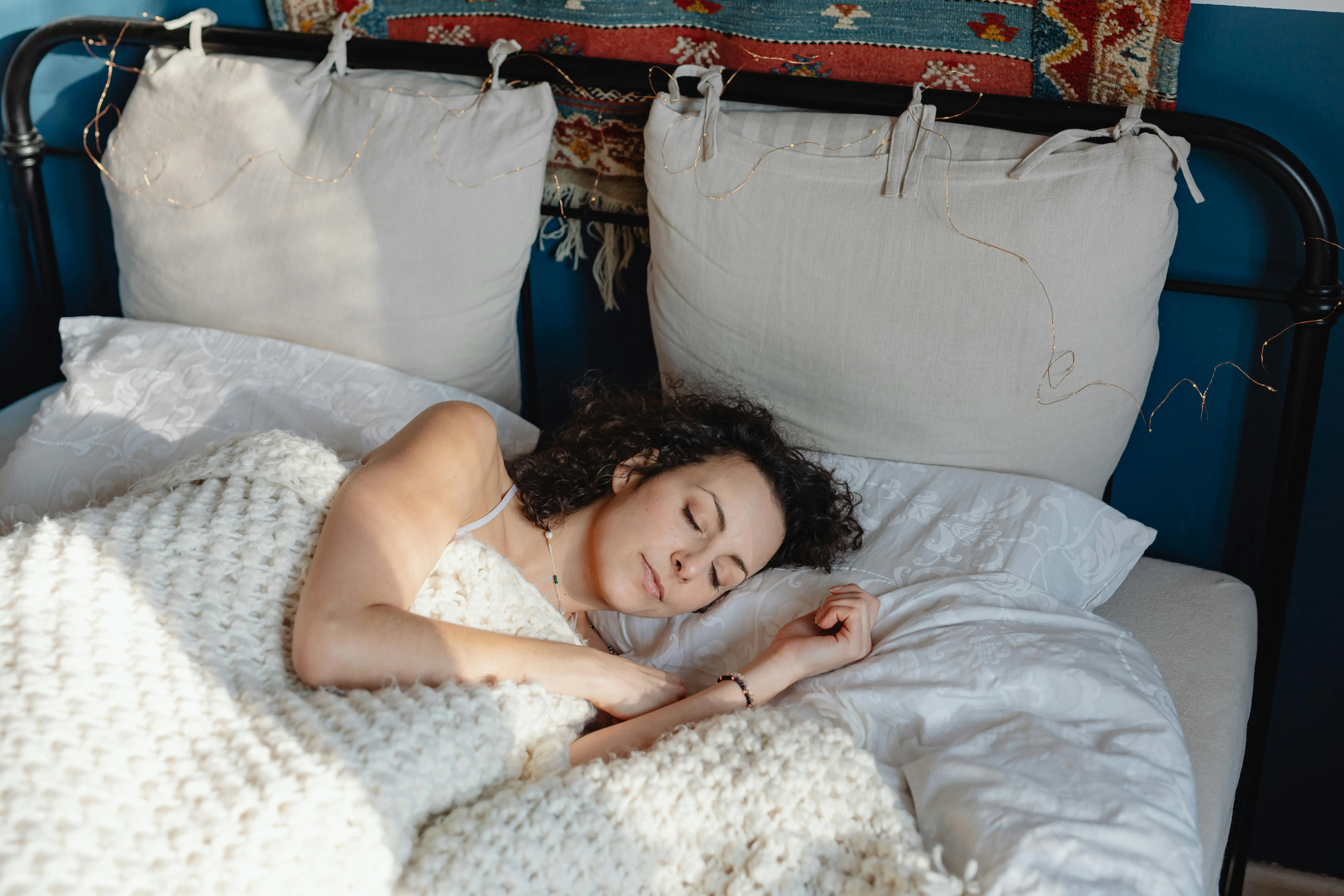5 Key Factors to Optimise Your Sleep Quality
5 Key Factors to Optimise Your Sleep Quality
5 Key Factors to Optimise Your Sleep Quality



Quality sleep is essential for overall well-being, affecting everything from mood and cognitive function to physical health. While many factors contribute to a good night's rest, understanding and optimizing certain aspects can significantly enhance sleep quality. Here are five key considerations to help you achieve optimal sleep:
Quality sleep is essential for overall well-being, affecting everything from mood and cognitive function to physical health. While many factors contribute to a good night's rest, understanding and optimizing certain aspects can significantly enhance sleep quality. Here are five key considerations to help you achieve optimal sleep:
Light Exposure 💡
Light Exposure 💡
Light plays a crucial role in regulating our circadian rhythm, the body's internal clock that influences sleep-wake cycles. Exposure to natural light, especially in the morning, helps synchronise this rhythm, signalling to your body that it's time to wake up and be alert. Conversely, exposure to artificial blue light from screens (phones, computers, TVs) in the evening can disrupt this cycle by suppressing melatonin production, making it harder to fall asleep. To optimise sleep, aim for at least 30 minutes of sunlight exposure in the morning and minimise blue light exposure in the evening by using blue light filters or avoiding screens before bedtime.
Light plays a crucial role in regulating our circadian rhythm, the body's internal clock that influences sleep-wake cycles. Exposure to natural light, especially in the morning, helps synchronise this rhythm, signalling to your body that it's time to wake up and be alert. Conversely, exposure to artificial blue light from screens (phones, computers, TVs) in the evening can disrupt this cycle by suppressing melatonin production, making it harder to fall asleep. To optimise sleep, aim for at least 30 minutes of sunlight exposure in the morning and minimise blue light exposure in the evening by using blue light filters or avoiding screens before bedtime.
Food Timing ⏰
Food Timing ⏰
The timing of meals can impact sleep quality. Consuming heavy or spicy meals close to bedtime can cause discomfort and indigestion, making it difficult to fall asleep. On the other hand, going to bed hungry may also disrupt sleep. Aim to have your last meal at least 2-3 hours before bedtime. Additionally, be mindful of caffeine and alcohol intake, as they can interfere with sleep patterns, with caffeine having a stimulating effect and alcohol disrupting REM sleep.
The timing of meals can impact sleep quality. Consuming heavy or spicy meals close to bedtime can cause discomfort and indigestion, making it difficult to fall asleep. On the other hand, going to bed hungry may also disrupt sleep. Aim to have your last meal at least 2-3 hours before bedtime. Additionally, be mindful of caffeine and alcohol intake, as they can interfere with sleep patterns, with caffeine having a stimulating effect and alcohol disrupting REM sleep.
Temperature Regulation 🥵
Temperature Regulation 🥵
Creating a comfortable sleep environment involves regulating room temperature. The ideal bedroom temperature for most people ranges between 15-20°C (59-68°F). A cooler room promotes better sleep by facilitating the body's natural temperature drop, which occurs as part of the sleep onset process. Experiment with bedding materials and adjust room temperature to find what works best for you. Additionally, consider using breathable fabrics for bedding to prevent overheating during the night.
Creating a comfortable sleep environment involves regulating room temperature. The ideal bedroom temperature for most people ranges between 15-20°C (59-68°F). A cooler room promotes better sleep by facilitating the body's natural temperature drop, which occurs as part of the sleep onset process. Experiment with bedding materials and adjust room temperature to find what works best for you. Additionally, consider using breathable fabrics for bedding to prevent overheating during the night.
Supplementation 💊
Supplementation 💊
Certain supplements may support better sleep quality, although it's essential to consult with a healthcare professional before adding them to your routine. Melatonin supplements can help regulate sleep-wake cycles, particularly for individuals with insomnia or jet lag. Magnesium is another popular supplement known for its calming effects and its role in promoting relaxation. Other options include valerian root, chamomile, and L-theanine, all of which have been linked to improved sleep quality in some studies. However, individual responses to supplements vary, so it's essential to start with low doses and monitor how your body reacts.
Certain supplements may support better sleep quality, although it's essential to consult with a healthcare professional before adding them to your routine. Melatonin supplements can help regulate sleep-wake cycles, particularly for individuals with insomnia or jet lag. Magnesium is another popular supplement known for its calming effects and its role in promoting relaxation. Other options include valerian root, chamomile, and L-theanine, all of which have been linked to improved sleep quality in some studies. However, individual responses to supplements vary, so it's essential to start with low doses and monitor how your body reacts.
Stress Management 😥
Stress Management 😥
Stress and anxiety are common culprits behind poor sleep quality. Practicing relaxation techniques such as deep breathing, meditation, or progressive muscle relaxation can help calm the mind and prepare the body for sleep. Establishing a bedtime routine that includes activities like reading, gentle stretching, or taking a warm bath can signal to your body that it's time to unwind. Additionally, addressing underlying stressors through therapy, journaling, or seeking support from loved ones can have a significant impact on sleep quality over time.
Stress and anxiety are common culprits behind poor sleep quality. Practicing relaxation techniques such as deep breathing, meditation, or progressive muscle relaxation can help calm the mind and prepare the body for sleep. Establishing a bedtime routine that includes activities like reading, gentle stretching, or taking a warm bath can signal to your body that it's time to unwind. Additionally, addressing underlying stressors through therapy, journaling, or seeking support from loved ones can have a significant impact on sleep quality over time.
Conclusion
Conclusion
Optimising sleep involves considering various factors that influence our sleep-wake cycles and overall sleep quality. By prioritizing light exposure, food timing, temperature regulation, supplementation, and stress management, you can create an environment conducive to restorative sleep. Experiment with different strategies and listen to your body's cues to find what works best for you. Remember that consistency and patience are key when it comes to improving sleep habits, and small changes can lead to significant improvements in the long run.
Optimising sleep involves considering various factors that influence our sleep-wake cycles and overall sleep quality. By prioritizing light exposure, food timing, temperature regulation, supplementation, and stress management, you can create an environment conducive to restorative sleep. Experiment with different strategies and listen to your body's cues to find what works best for you. Remember that consistency and patience are key when it comes to improving sleep habits, and small changes can lead to significant improvements in the long run.
Read more
Read more



Electromagnetic Fields
Electromagnetic Fields
Living a healthy life in our modern world presents unique challenges, and one of them is the exposure to EMFs…
Living a healthy life in our modern world presents unique challenges, and one of them is the exposure to EMFs…



